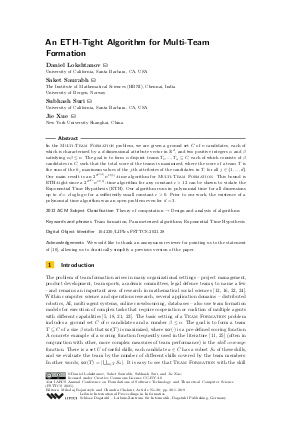@InProceedings{lokshtanov_et_al:LIPIcs.FSTTCS.2021.28,
author = {Lokshtanov, Daniel and Saurabh, Saket and Suri, Subhash and Xue, Jie},
title = {{An ETH-Tight Algorithm for Multi-Team Formation}},
booktitle = {41st IARCS Annual Conference on Foundations of Software Technology and Theoretical Computer Science (FSTTCS 2021)},
pages = {28:1--28:9},
series = {Leibniz International Proceedings in Informatics (LIPIcs)},
ISBN = {978-3-95977-215-0},
ISSN = {1868-8969},
year = {2021},
volume = {213},
editor = {Boja\'{n}czyk, Miko{\l}aj and Chekuri, Chandra},
publisher = {Schloss Dagstuhl -- Leibniz-Zentrum f{\"u}r Informatik},
address = {Dagstuhl, Germany},
URL = {https://drops.dagstuhl.de/entities/document/10.4230/LIPIcs.FSTTCS.2021.28},
URN = {urn:nbn:de:0030-drops-155391},
doi = {10.4230/LIPIcs.FSTTCS.2021.28},
annote = {Keywords: Team formation, Parameterized algorithms, Exponential Time Hypothesis}
}

 Creative Commons Attribution 4.0 International license
Creative Commons Attribution 4.0 International license























